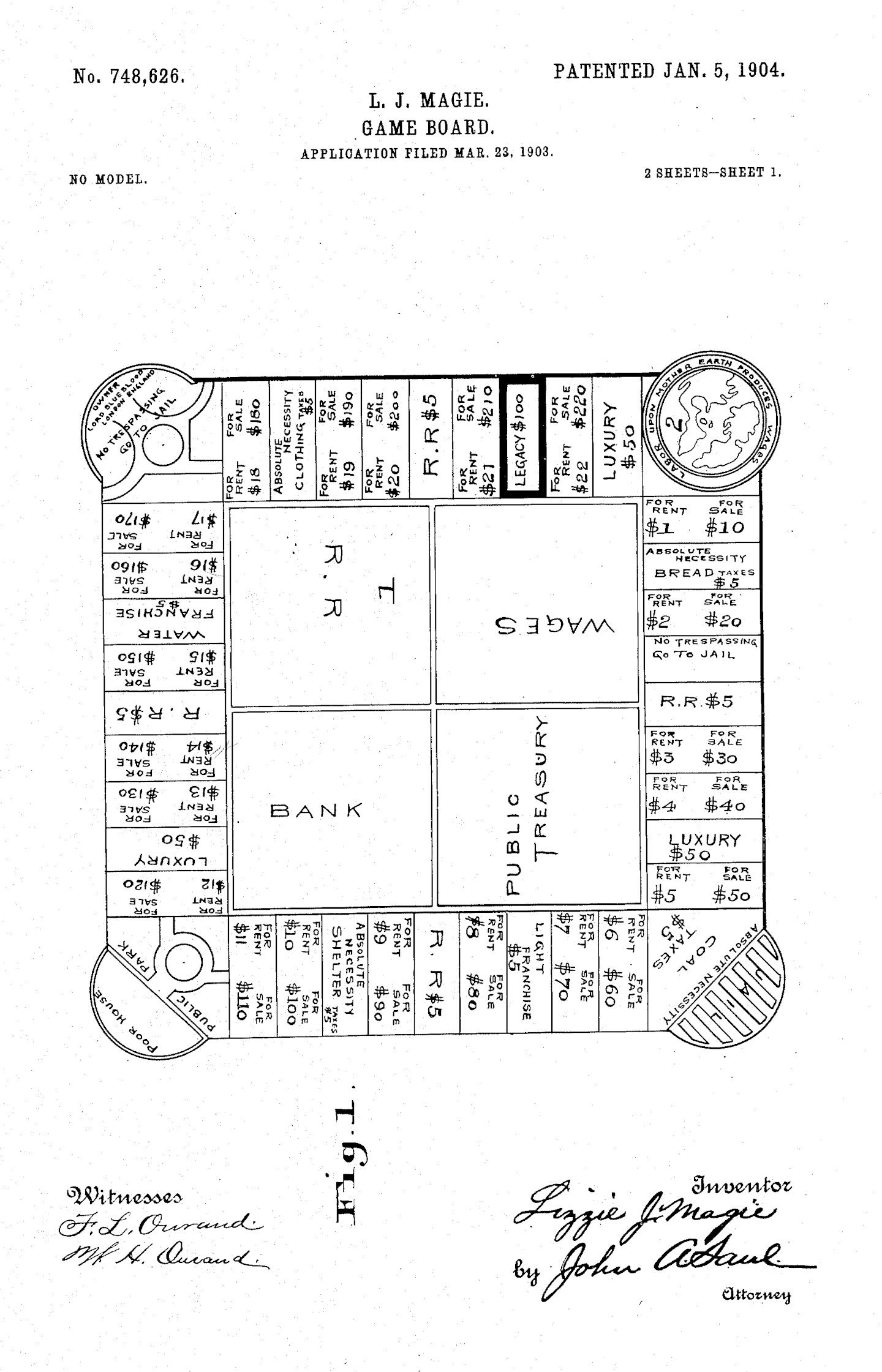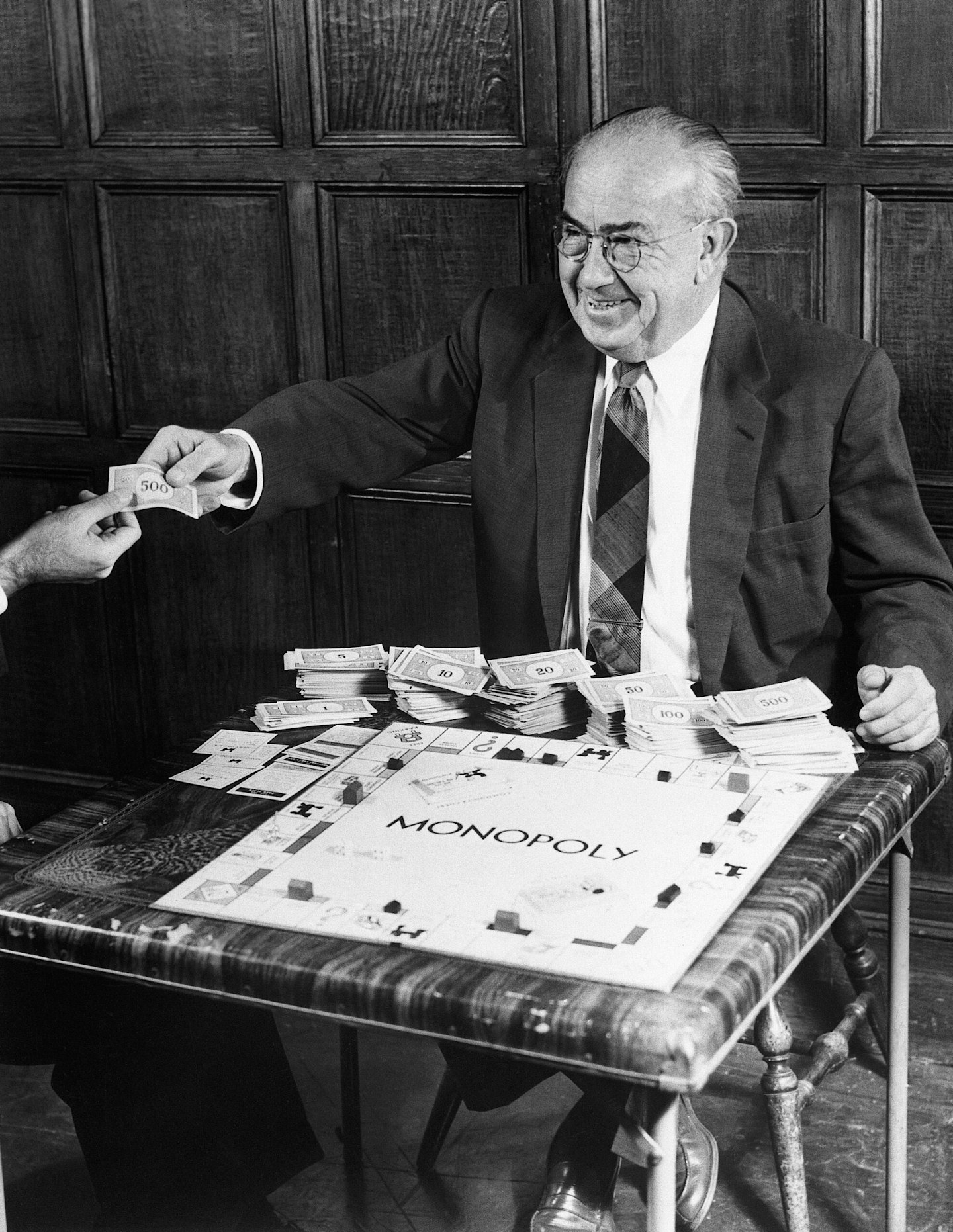At one point or another, everyone has sat down with their family or friends and played a game of Monopoly. Whether you love it or loathe it, the board game has become a ubiquitous addition to cupboards and cubby-holes all around the world. It’s spawned hundreds of editions based on everything from cities and countries to television shows and football teams, but have you ever heard of Lizzie Magie? Is this largely forgotten name the true answer to the question: ‘who invented Monopoly’?
Young Lizzie: The Seeds of Invention
Elizabeth J Magie was born in Macomb, a rural town in Illinois on 9th May 1866. She was the third child of Mary Jane and James K Magie. Her father, a newspaperman and writer who fought for the Union in the American Civil War, was an outspoken critic of slavery and supporter of Abraham Lincoln.
Young Elizabeth took after her father in many ways, sharing his interest in journalism, his progressive political perspective and ambitious streak, she said of him: ‘I have often been called a “chip off the old block”, which I consider quite a compliment, for I am proud of my father for being the kind of an “old block” that he is.’
By 1890, the Magies had moved to Washington DC, and Elizabeth branched out on her own, taking up work as a typist and stenographer for the postal service’s ‘Dead Letter Office’ before striking out on her own as an independent stenographer in 1900.

Unusual for a woman of the time, Lizzie did not marry until she was in her 40s, preferring instead to focus on her work, activism, and creative pursuits — writing poetry and short stories, and performing on stage, initially in comedy routines, but later appearing in a 1905 production of Ibsen’s Hedda Gabler.
The Landlord’s Game
Henry George (1839-1897) was an influential and popular economist of the time and Lizzie had been given a copy of George’s 1879 book, Progress and Poverty, by her father. The basic Georgist theory recommends that instead of taxing income or goods, there should be a single tax on land. This idea appealed to Lizzie, and provided the inspiration for what would become her most famous invention: The Landlord’s Game.
Originally conceived as a teaching tool to explain the economic issues that a Georgist single tax was supposed to correct, The Landlord’s Game has many features in common with modern Monopoly. It consists of a square board with four railway stations, a jail, and wages to collect at the start of each lap around the continuous path. Players must also buy and sell property with paper money.

Elizabeth Magie was granted a patent for The Landlord’s Game in 1904, the second patent in her name (she had invented a typewriter modification in 1893) in an age when less than 1% of patents were held by women.
Activism
In 1906, Magie moved to Chicago, and although she supported herself, times weren’t easy for unmarried young women and she was frustrated at her low wages. Lizzie turned to satire to protest the role of women in the workforce. She took out an advert in a major newspaper offering herself up to ‘the highest bidder’ to mock the necessity for women to marry to survive — a radical belief for the 1900s.
The stunt gained a lot of attention and became the talk of gossip columns around the country, marking Magie out as a proud and outspoken feminist. When asked about the ad, she told the National Tribune: ‘I ask nothing more than a fair chance. I get $10 a week as a stenographer now. That is no pay for a woman of ambition. I wish to be constructive, not a mere mechanical tool for transmitting a man’s spoken thoughts to letter paper.’

The Rise of Monopoly
Magie continued to refine her board game while in Chicago, and joined with some friends to found the Economic Games Company through which the earliest copies of The Landlord’s Game were sold. Although the game was not commercially successful, it found a place in Economics lecture halls, classrooms, and student residences at universities like Harvard, Columbia and the Wharton School of Finance and Economy.
By the time of her second patent on The Landlord’s Game in 1924, Lizzie (now Lizzie Magie Phillips, following her 1910 marriage to Albert Phillips) had moved back to the east coast. There were now two sets of rules: The Landlord’s Game/Monopoly and Prosperity. Magie thought this would better illustrate the benefits of the single tax. The aim of The Landlord’s Game was to gather wealth and property to control the board, whereas Prosperity had players pay into in a centralised Land Rent Fund.

Her original patent had lapsed, and versions of her game were springing up across the north-eastern USA with hand-drawn boards and word-of mouth rules. However, despite publication by Adgame Inc in 1932, Prosperity didn’t catch on and only Monopoly was taking hold.
The Quaker communities in Atlantic City shared the game, using household objects as pieces, and changing the properties to reflect their local neighbourhood. But it was a dinner party in Philadelphia which would prove particularly significant to the history of Magie’s creation, as it was where Charles Darrow first played a bootlegged version of the game.
Monopolising Money
Charles B Darrow is widely credited as the inventor of Monopoly. He was taught the game by Charles Todd who had become familiar with it thanks to friends in Atlantic City. Todd recalled that ‘Darrow asked me if I would write up the rules and regulations and I wrote them up’. Darrow was a salesman and, seeing a golden opportunity, he created his own version of Monopoly. He first sold a few copies at a local department store before taking his board to the toy and games manufacturer Parker Brothers.

Worried about potential rival games, Parker Brothers approached Magie Phillips and she agreed to sell them her patent in exchange for $500 and publication of The Landlord’s Game and two of her other creations: King’s Men and Bargain Day. She sold her rights to her game in November 1935 at the age of 70. Charles Darrow received his patent for Monopoly in December of that same year.
In 1936, Lizzie walked into a store near her home in Virginia and was shocked to see Monopoly on the shelf. The similarities to her Landlord’s Game were obvious, yet the box listed Charles Darrow as the game’s inventor. She wrote to the press to tell the world how she had invented The Landlord’s Game. An article in Washington DC’s Evening Star notes: ‘if one counts lawyer’s, printer’s and Patent Office fees used up in developing it, the game has cost her more than she made from it.’
Parker Brothers did eventually publish all three of Magie’s games as promised. However, with little advertising or promotion, they quickly faded into obscurity and were overshadowed by the phenomenon that Darrow’s Monopoly had become.
Legacy
Lizzie Magie was a forgotten figure of board game history until the 1970s when a legal dispute between Parker Brothers and another games designer shone a light on Magie’s involvement in the creation of Monopoly.
Although the intended message of her invention is lost, they key gameplay elements remain, and the Monopoly we all know (and some of us love) would not exist today without the pioneering woman who brought it to life in 1904.
10 MORE THINGS YOU NEVER KNEW ABOUT MONOPOLY

BOARD GAMES QUIZ

